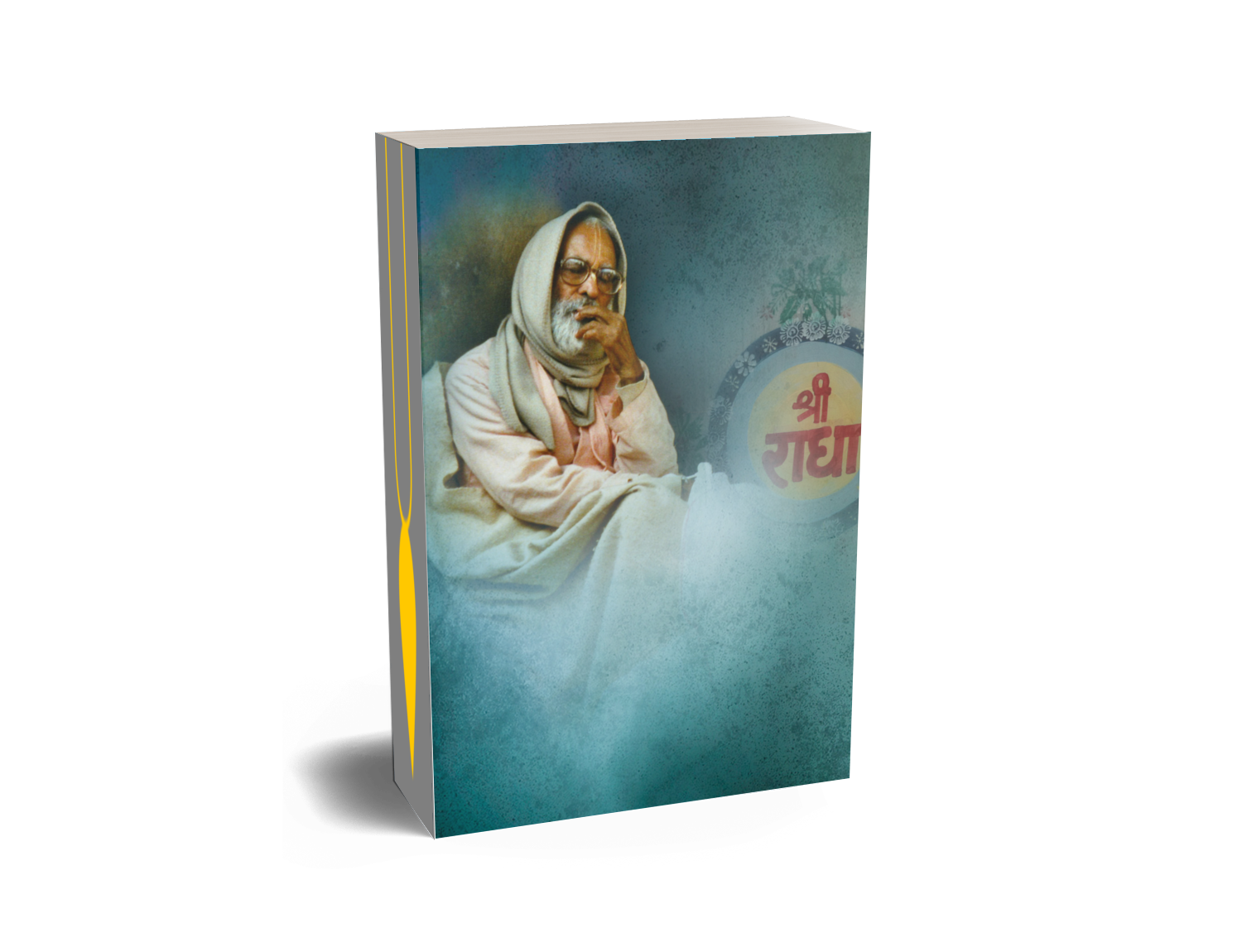
ekādaśī, janmāṣṭamī, vāmana-dvādaśī
śrī-rāma-navamī, āra nṛsiṁha-caturdaśī
“Ekādaśī, Janmāṣṭamī, Vāmana-dvādaśī, Rāma-navamī and Nṛsiṁha-caturdaśī — all these should be described.”
Śrī Caitanya-caritāmṛta (Madhya-līlā 24.341)
ei sabe viddhā-tyāga, aviddhā-karaṇa
akaraṇe doṣa, kaile bhaktira lambhana
“You should recommend the avoidance of mixed Ekādaśī and the performance of pure Ekādaśī. You should also describe the fault in not observing Ekādaśī. One should be very careful as far as these items are concerned. If one is not careful, one will be negligent in executing devotional service.”
Śrī Caitanya-caritāmṛta (Madhya-līlā 24.342)

The following is an excerpt from Maharṣi Durvāsā & Śrī Durvāsā-āśrama by Śrīla Bhaktivedānta Nārāyaṇa Mahārāja
On the bank across the river from Durvāsā’s āśrama was the beautiful palace of Mahārāja  Ambarīṣa. Mahārāja Ambarīṣa came to this place, far away from his capital, for the purpose of performing sādhana-bhajana.
Ambarīṣa. Mahārāja Ambarīṣa came to this place, far away from his capital, for the purpose of performing sādhana-bhajana.
Once he was following a Mahā-dvādaśī vow of fasting from all food and water while remaining awake all night. The following morning, after performing his daily duties such as bathing, chanting gāyatrī-mantra and performing his arcana-pūjā, he requested the Vaiṣṇavas, brāhmaṇas and guests who were present there to accept bhagavat-prasāda. He himself desired to break his fast by accepting Bhagavān’s caraṇāmṛta when suddenly, Maharṣi Durvāsā arrived. Mahārāja Ambarīṣa became very pleased to see him and said, “O great sage, today it is our great  fortune to have the opportunity to serve a guest of your stature. Ṭhākurajī’s mahā-prasāda is before you; please accept it.”
fortune to have the opportunity to serve a guest of your stature. Ṭhākurajī’s mahā-prasāda is before you; please accept it.”
As mentioned earlier, Durvāsā was a temperamental ṛṣi; his nature was most peculiar. No one knew what he would do next. Śrī Durvāsā Ṛṣi said, “I have not yet finished my daily duties such as bathing. After going to the Yamunā and performing them, I will return here.” Saying this, he left for the bank of the Yamunā.
The prescribed time to break the fast was within two hours after sunrise, and it was quickly expiring. Durvāsā was late returning. Mahārāja Ambarīṣa found himself in a dilemma. If he broke his fast without having fed his brāhmaṇa guest, he would be guilty of disrespecting him and of violating the rules of suitable moral worldly conduct. Also, if the ṛṣi became dissatisfied, he could possibly curse Mahārāja Ambarīṣa. But on the other hand, by not breaking his Mahā-dvādaśī fast within the scheduled time, his bhakti would suffer. After consulting with brāhmaṇas who were conversant with the laws of dharma, he broke his Mahā-dvādaśī fast by accepting a single drop of caraṇāmṛta. In scriptures there is provision for those who fast from water for the day to break their fast the following morning with caraṇāmṛta or other liquids. But for those who  accept foods such as fruit as anukalpa (a token amount of non-grain prasāda) on the day of their fast, the rule is that they must break their fast the following morning with food grains that have been offered to Bhagavān. In any circumstance one should never disrespect bhakti; otherwise one’s bhakti will be destroyed. To protect one’s spiritual life it is proper to leave considerations of mundane dharma aside. With this understanding, Mahārāja Ambarīṣa broke his fast with caraṇāmṛta. By doing so, his Mahā-dvādaśī fast was simultaneously broken and also not broken.
accept foods such as fruit as anukalpa (a token amount of non-grain prasāda) on the day of their fast, the rule is that they must break their fast the following morning with food grains that have been offered to Bhagavān. In any circumstance one should never disrespect bhakti; otherwise one’s bhakti will be destroyed. To protect one’s spiritual life it is proper to leave considerations of mundane dharma aside. With this understanding, Mahārāja Ambarīṣa broke his fast with caraṇāmṛta. By doing so, his Mahā-dvādaśī fast was simultaneously broken and also not broken.
As soon as Mahārāja Ambarīṣa had broken his fast, Durvāsā Ṛṣi arrived there. By his mystic power, he knew that Mahārāja Ambarīṣa had broken his fast, and he began to tremble with anger. “You are a big atheist!” he said. “You invited me to take prasāda, but before feeding me you ate something yourself. Now I will punish you.” Saying this he tore some matted hair from his head and threw it on to the ground. From this hair, a female fire demon named Kṛtyā manifested and approached Mahārāja Ambarīṣa to burn him to ashes. Mahārāja Ambarīṣa simply stood there with folded hands. He was completely fearless because he was exclusively surrendered to Bhagavān.
Just then Bhagavān, who is especially affectionate to His devotees, sent His Sudarśana cakra there to protect 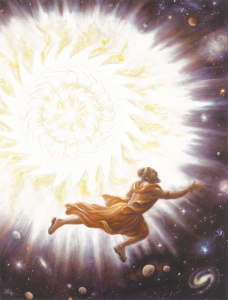 His devotee.
His devotee.
The cakra burnt the rākṣasī Kṛtyā to ashes and then turned towards Durvāsā. Durvāsā was terrified and ran for his life. He crossed Pātāla, Svarga and all the other fourteen planetary systems. Finally, he arrived at Śiva-loka where he began beseeching Śaṅkara to save him. All the while the Sudarśana cakra followed behind him at great speed. Upon seeing him, Śaṅkara said, “You are quite peculiar. You have quarrelled with a devotee of Bhagavān. You do not know glories of His devotees? I cannot offer any help to someone who has committed an offence at the feet of a devotee of Bhagavān. Go directly to Bhagavān Viṣṇu; it is His cakra. Only He and no one else can protect you.”
Durvāsā immediately went to Viṣṇu-loka and began praying for his life at the feet of Bhagavān Viṣṇu: “Prabhu! Please save me, I am severely aggrieved. Other than You there is no one who can save me.
I am fully surrendered to You. Since You are affectionate to those who take shelter of You, it is natural for You to protect me.”
Bhagavān Viṣṇu replied, “I am unable to protect those who are inimical to My devotees. I am the heart of My devotees and they are My heart. I can never abandon them, and I am actually under their control. Only the devotee at whose feet you have committed an offence can forgive you; I am unable to. Therefore, if you desire your own well-being, return to my devotee Ambarīṣa and beg forgiveness from him.”
Hearing this, Maharṣi Durvāsā became quite desperate. Seeing no other solution, he decided to return to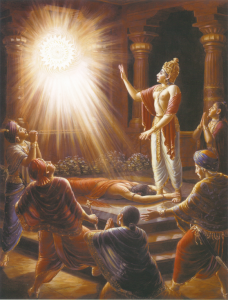 Mahārāja Ambarīṣa. When he arrived there, Mahārāja Ambarīṣa folded his hands and humbly offered praṇāma to him. But Durvāsā fell at his feet and, for his own welfare, begged forgiveness and began praying for his life. Mahārāja Ambarīṣa then pacified the Sudarśana cakra by offering prayers to it.
Mahārāja Ambarīṣa. When he arrived there, Mahārāja Ambarīṣa folded his hands and humbly offered praṇāma to him. But Durvāsā fell at his feet and, for his own welfare, begged forgiveness and began praying for his life. Mahārāja Ambarīṣa then pacified the Sudarśana cakra by offering prayers to it.
Upon learning of the remarkable glory of bhakti, Durvāsā was astonished and said, “How fortunate are the devotees of Bhagavān! Today I have learned the greatness of Bhagavān Anantadeva’s devotees. O King, although I offended you, still you desired only auspiciousness for me. For those saintly persons who have grasped the lotus feet of bhakta-vatsala Bhagavān Śrī Hari with their firm prema-bhāva, what activity could be difficult? The hearts of those mahātmās who serve the lotus feet of T īrthapāda Bhagavān are so magnanimous that they are capable of renouncing anything, and their auspicious instructions purify the hearts of others; therefore, they remain bereft of nothing whatsoever. Aho! You have been very kind to me. Disregarding my offence, you have saved my life.”
From the moment Durvāsājī had begun running here and there to save his own life, Mahārāja Ambarīṣa had not eaten anything. He was simply waiting for Durvāsā to return. He touched Durvāsā’s feet and then lovingly fed him. Being satisfied with the meal, Durvāsājī respectfully said, “O King, now you also take your meal.”
Satisfied, Durvāsā sang the praises of Mahārāja Ambarīṣa and returned to his āśrama. Maharṣi Durvāsā’s character changed after this incident with Mahārāja Ambarīṣa. From that time on he was indifferent toward impersonal knowledge (brahma-jñāna) and the practice of eightfold mysticism (aṣṭāṅga-yoga). Having learned the glories of pure devotees, he became inclined towards the path of devotion to Bhagavān (bhakti).

The following is an excerpt of a lecture by Śrīla Bhaktivallabha Tīrtha Mahārāja, published in Śrī Mādhava-tithi (Glories of Śrī Ekādaśī-vrata)
Then, the sage went to Śrī Ambarīṣa Mahārāja, who had been observing Śrī Ekādaśī vrata for one year. He had observed all of the ekādaśīs without taking even a drop of water.
On the day of daśamī he would eat only once, and on the day of dvādaśī he would eat only once. Although he was the emperor, he would spend all of his time in this way. He had established a congress committee to manage his empire.
 The following is an excerpt of a darśana with Śrīla Bhaktivedānta Nārāyaṇa Mahārāja in Orlando, on May 24, 2010, published in Walking with A Saint – Morning Walks and Conversations 2010
The following is an excerpt of a darśana with Śrīla Bhaktivedānta Nārāyaṇa Mahārāja in Orlando, on May 24, 2010, published in Walking with A Saint – Morning Walks and Conversations 2010
Rādhā-kānta dāsa: In Gopāla-campū, Śrīla Jīva Gosvāmī has written about how Nanda Mahārāja and Yaśodā-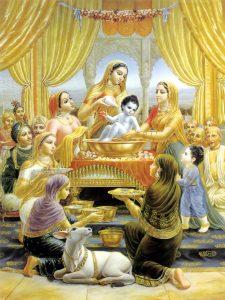 devī followed dvādaśī-vrata for one year in order to have a son, because they were not able to have a son. I was just wondering, Gurudeva, I know the meaning of ekādaśī-vrata, but what does dvādaśī-vrata mean?
devī followed dvādaśī-vrata for one year in order to have a son, because they were not able to have a son. I was just wondering, Gurudeva, I know the meaning of ekādaśī-vrata, but what does dvādaśī-vrata mean?
Śrīla Bhaktivedānta Nārāyaṇa Mahārāja: There are some Ekādaśīs that are called Mahā-dvādaśī. [There are eight Mahā-dvādaśīs per year.] When Ekādaśī and Dvādaśī both fall on the same day, then the Ekādaśī vows are followed on the Dvādaśī day. That is what Mahārāja Ambarīṣa was doing.*
Rādhā-kānta dāsa: Ah. And also Nanda Mahārāja?
Śrīla Bhaktivedānta Nārāyaṇa Mahārāja: Nanda Mahārāja also.
* If Daśamī (the tenth day of the moon) is completed before 3:30 am of the Ekādaśī day (the eleventh day of the moon), then we follow the Ekādaśī fast on the Ekādaśī day. If Daśamī overlaps Ekādaśī, that is, if it ends after 3:30 am, then that Ekādaśī is not a pure Ekādaśī. In that circumstance, one follows the ekādaśī-vrata on the Dvādaśī day. If there is a doubt as to the timings, then one follows Ekādaśī on the Dvādaśī day.
Mahā-dvādaśī and Ekādaśī are both considered to be mādhava-tithi (the day of Mādhava, Śrī Kṛṣṇa). The Ekādaśī fasting must be broken (the taking of pāraṇa) in the second part of the dvādaśī-tithi. Lord Viṣṇu lives with Tulasī-devī on the Dvādaśī day, therefore we don’t pick tulasī leaves on that day.

The following is an excerpt from a class given by Śrīla Bhaktivedānta Nārāyaṇa Mahārāja in Hawaii, on May 13, 2000
There are so many examples about Ekādaśī in the Śrīmad-Bhāgavatam, such as the story of Ambarīṣa Mahārāja. Mahārāja Ambarīṣa was a very powerful king, who was attacked by an agent of Durvāsā Ṛṣi. Durvāsā 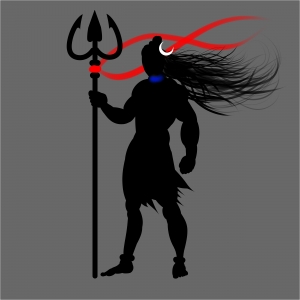 was not an angry person. He is a manifestation of Mahā-Śaṅkara (Lord Śiva). He was a high-class devotee. He wanted to glorify bhaktas and Ekādaśī, so he played a trick, just as Śaṅkara preached Māyāvāda philosophy on the order of Kṛṣṇa. Śaṅkara did this for the welfare of the whole world.
was not an angry person. He is a manifestation of Mahā-Śaṅkara (Lord Śiva). He was a high-class devotee. He wanted to glorify bhaktas and Ekādaśī, so he played a trick, just as Śaṅkara preached Māyāvāda philosophy on the order of Kṛṣṇa. Śaṅkara did this for the welfare of the whole world.
On our own, we cannot understand why the sage Durvāsā did so many apparently cruel things. Actually he is an exalted devotee, always serving and glorifying Kṛṣṇa. He wanted to give some teachings to us conditioned souls. That is why, just before dvādaśī-pāraṇa (the exact time for breaking the Ekādaśī fast), he told Mahārāja Ambarīṣa, “I am accepting your invitation to take prasādam here, but first I must take bath in the river and chant my Gāyatrī mantras.” Yamunā was very near, so he went there to take bath and recite prayers, and he intentionally returned late – after the pāraṇa (time for breaking fast) time was over.
We should try to be humble like Ambarīṣa Mahārāja, and very strong in the conclusions of bhakti. He was so humble that for one year he was waiting for when Durvāsā would come back thinking, “I must satisfy him first, and then I can take prasāda.” He was so humble:
tṛṇād api sunīcena
taror api sahiṣṇunā
amāninā mānadena
kīrtanīyaḥ sadā hariḥ
[“Thinking oneself to be even lower and more worthless than insignificant grass which has been trampled beneath everyone’s feet, being more tolerant than a tree, being pride-less, and offering respect to all others according to their respective positions, one should continuously chant the holy name of Śrī Hari.” (Śrī Śikṣāṣṭaka, verse 3)]

An excerpt from a letter, written by Śrīla Bhaktivedānta Svāmī Mahārāja to Pradyumna, dated April 29, 1970
Regarding your questions about the calendar-almanac:
1. Herā-pañcamī is correct (9 July 1970).
2. When there is an important Dvādaśī, the Ekādaśī fasting is transferred on the Dvādaśī, and this is called Mahā-dvādaśī. The 26th October, 1970, is actually Dvādaśī, so the fasting is observed together, or Ekādaśī fasting is disregarded, and the Dvādaśī (Mahā-dvādaśī) fasting is taken as important.
You were given this old Pañjikā just to consult the names and spelling only. The dates are different, so whatever date I have given, that is correct. Why you are searching Vyañjulī-dvādaśī in this last year’s Pañjikā? What I have given is from this year’s Pañjikā, so everything will not collaborate.
3. The word is ओड़न. That is called Oḍana-ṣaṣṭhī and the date is 14th December, 1970. That is correct even if you do not find it in the dictionary. The dictionary may not have every word.
5. 7th February, 1971—Varāha-dvādaśī, I have explained the position in regard to #2.
6. So far determining Ekādaśī it is counted 11 days after the full moon and 11 days after the new moon, but sometimes it so happens as you have noted one day later. However, what I have given is correct.
The Pañjikā which I gave you is old Pañjikā, our calendar is for this new year.

The following is an excerpt from Śrīla Bhaktivedānta Vāmana Mahārāja’s introduction to Śrī Mādhava-tithi (Glories of Śrī Ekādaśī-vrata)
One should accept only the vow of pure ekādaśī and should reject aruṇodaya-viddhā or daśamī-viddhā ekādaśī  (ekādaśī polluted by daśamī). Ekādaśī mixed with daśamī is considered to be contaminated with all of the sins of the three worlds. Demons and atheists take shelter of ekādaśī mixed with daśamī; Bhagavān bestows the desired result only on one who fasts on ekādaśī connected with dvādaśī. Ekādaśī that is polluted by daśamī is not considered hari-vāsara. Thus, one should perform pāraṇa (breaking the fast) on trayodaśī. Jagadguru Śrīla Bhaktivinoda Ṭhākura has sung: mādhava-tithi bhakti-jananī, yatane pālana kari. Yatane pālana kari means that one should reject this polluted (viddhā) ekādaśī. Ekādaśī has many names, and there are eight great dvādaśīs with different names. This book includes many histories and details related to ekādaśī, and there is no doubt that it will be very helpful for those who choose to follow ekādaśī. The appendix includes a description of
(ekādaśī polluted by daśamī). Ekādaśī mixed with daśamī is considered to be contaminated with all of the sins of the three worlds. Demons and atheists take shelter of ekādaśī mixed with daśamī; Bhagavān bestows the desired result only on one who fasts on ekādaśī connected with dvādaśī. Ekādaśī that is polluted by daśamī is not considered hari-vāsara. Thus, one should perform pāraṇa (breaking the fast) on trayodaśī. Jagadguru Śrīla Bhaktivinoda Ṭhākura has sung: mādhava-tithi bhakti-jananī, yatane pālana kari. Yatane pālana kari means that one should reject this polluted (viddhā) ekādaśī. Ekādaśī has many names, and there are eight great dvādaśīs with different names. This book includes many histories and details related to ekādaśī, and there is no doubt that it will be very helpful for those who choose to follow ekādaśī. The appendix includes a description of  the eight great dvādaśīs, a song about the duties on the day of ekādaśī, and further glorification of ekādaśī. These additions will provide further insight and appreciation for followers of this vow. Our service and efforts in making this book will be meaningful if readers follow this vow and attain devotion to Bhagavān. What more can we say; it is our humble entreaty that if readers find any shortcomings or omissions in this book due to our inattention, out of kindness they will let us know so that the book can be corrected. Alaṁ iti vistareṇa (let this be enough).
the eight great dvādaśīs, a song about the duties on the day of ekādaśī, and further glorification of ekādaśī. These additions will provide further insight and appreciation for followers of this vow. Our service and efforts in making this book will be meaningful if readers follow this vow and attain devotion to Bhagavān. What more can we say; it is our humble entreaty that if readers find any shortcomings or omissions in this book due to our inattention, out of kindness they will let us know so that the book can be corrected. Alaṁ iti vistareṇa (let this be enough).
The following is an excerpt from the appendix of Śrī Mādhava-tithi (Glories of Śrī Ekādaśī-vrata)
Eight Mahā-dvādaśīs
One should also know about the eight Mahā-dvādaśīs, which are described in Brahma-vaivarta Purāṇa in a conversation between Śrī Sūta Gosvāmī and Śaunaka Ṛṣi.
Śrī Sūta Gosvāmī said, “O learned brāhmaṇa, the eight Mahā-dvādaśīs are Unmīlanī, Vyañjulī, Trispṛśā, Pakṣavardhinī, Jayā, Vijayā, Jayantī, and Pāpanāśinī. They are very auspicious and they destroy all of one’s sinful reactions. Among these, the first four occur according to the tithi or day, and the latter four occur according to nakṣatra or stars. Each destroys heaps of sinful reactions.”
The specialities of the eight Mahā-dvādaśīs are as follows.
If an ekādaśī extends to the day of dvādaśī, but the day of dvādaśī is not extended, it is called Unmīlanī Mahā-dvādaśī. It destroys all of one’s sinful reactions.
If an ekādaśī does not extend to the day of dvādaśī, but the dvādaśī extends to the day of trayodaśī, it is called Vyañjulī Mahā-dvādaśī. It counteracts unlimited sins.
If an ekādaśī extends to the sunrise on the day of dvādaśī and the dvādaśī extends to the sunrise of trayodaśī, it is called Trispṛśā Mahā-dvādaśī. It is extremely dear to Lord Hari. If the ekādaśī overlaps with daśamī, it is not a Trispṛśā Mahā-dvādaśī.
If an Amāvasyā or Pūrṇimā is extended, the dvādaśī that comes before it is known as Pakṣavardhinī Mahā-dvādaśī. Instead of observing a fast on ekādaśī, one should observe it on dvādaśī.
These four dvādaśīs are determined according to the conjunction of the days.
In a conversation between sage Vasiṣṭha and King Māndhātā in Brahma-purāṇa, it is said that if the Nakṣatra called Punarvasu touches the day of dvādaśī of the waxing moon, it is called Jayā Mahā-dvādaśī. It is a very auspicious tithi.
Viṣṇu-dharmottara states that when Śravaṇa Nakṣatra conjoins with the dvādaśī of the waxing moon, it is called Vijayā Mahā-dvādaśī. This Mahā-dvādaśī is unlimitedly glorious since Śrī Vāmanadeva appeared during Śravaṇa Nakṣatra. Moreover, if this Mahā-dvādaśī occurs on a Wednesday in the month of August, its glories cannot even be estimated. One should particularly discuss topics regarding Śrī Vāmanadeva on that day.
If a dvādaśī of the waxing moon is conjoined with Rohiṇī Nakṣatra, it is the auspicious Jayantī Mahā-dvādaśī. It destroys all of one’s sinful reactions. This Jayantī Mahā-dvādaśī is extremely glorious since Lord Kṛṣṇa appeared during Rohiṇī Nakṣatra. One should discuss Lord Kṛṣṇa’s birth and other pastimes on this day.
Brahma-purāṇa states that if a dvādaśī of the waxing moon is conjoined with Puṣya Nakṣatra, it is called Pāpanāśinī Mahā-dvādaśī. By fasting on this day, one obtains the result of observing one thousand ekādaśīs. If Pāpanāśinī Mahā-dvādaśī occurs in the month of March, it awards unlimited piety.
Although the scriptures describe various benedictions obtained by following these vows, an intelligent, pure devotee should totally abandon the desire for results related to his own sense gratification, and aspire for pure devotional service, which aims to gratify Kṛṣṇa’s senses. Such a devotee should consider love of God to be the supreme goal of life.
Whenever one of these eight Mahā-dvādaśīs occurs, pure devotees should uphold its prestige, even if they have to give up observing the previous ekādaśī. By observing a Mahā-dvādaśī, ekādaśī is also observed, and Lord Hari will be greatly pleased.

Image/Art made possible by Pixabay.com & Krishnapath.org








